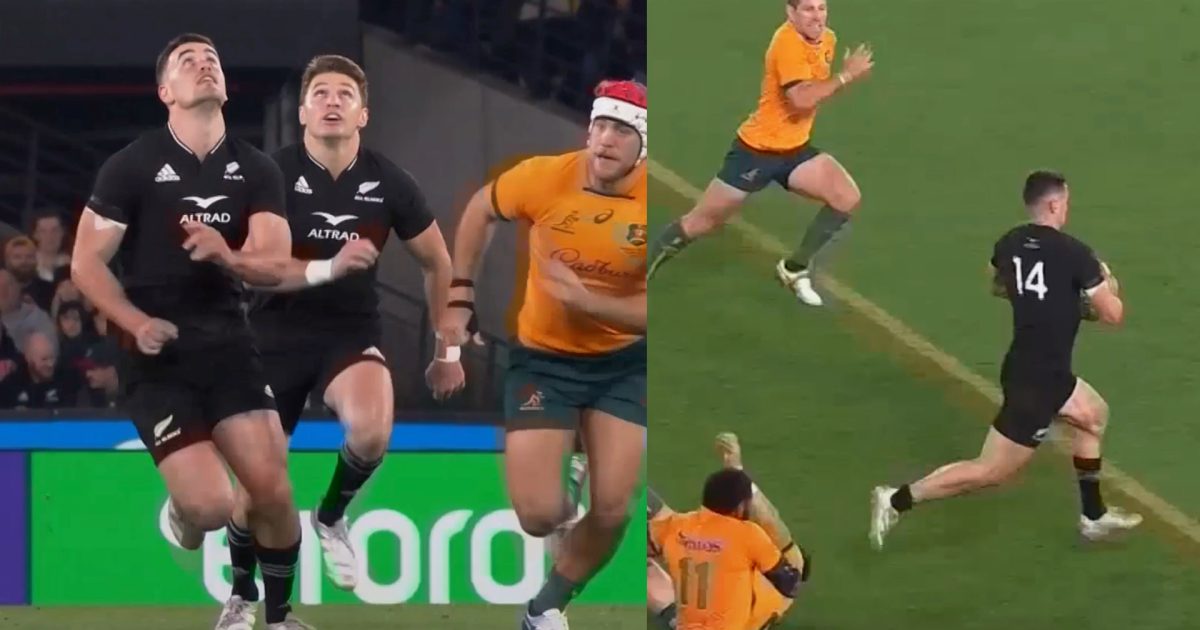Watch: Will Jordan and Beauden Barrett combine for scorching long-range effort

After a rare drought of four tests without a try, All Black right wing Will Jordan exploded at Marvel Stadium in Melbourne to score another incredible long range five pointer.
The Crusaders fullback combined brilliantly with reserve first five Beauden Barrett to find a weakness in behind the Wallabies defence in the 55th minute.
Jordan snatched Barrett’s chip kick out of the air on the full before putting a deadly left foot step on Wallabies fullback Andrew Kellaway who had raced up to try shut down the kick.
The Wallabies cover defence could not close on him as the 24-year-old speedster turned on the jets to outpace three defenders and score his 20th test try in as many appearances.
Hoake T?tou | Lesssssssshgooooooooo
🎥 @skysportnz pic.twitter.com/MvTJkfSsEC
— All Blacks (@AllBlacks) September 15, 2022
Jordan’s try gave the All Blacks a 31-13 lead with 25 minutes remaining which many thought would have sealed the game but a massive Wallabies comeback saw the home side take the lead.
Two tries to Andrew Kellaway closed the gap dramatically before a brilliant try to Pete Samu down the left hand side levelled scores at 34-all.
The Wallabies took an unlikely 37-34 lead when Nic White landed a penalty goal from nearly 50 metres out with minutes remaining.
What a beauty from Will Jordan. Game set and done. #AUSvNZL
— Ofentse (@LehongOfentse) September 15, 2022
That kick, that catch, that fade and that bolt by Jordan – magic 🔥 #AUSvNZL
— Melissa Davies (@silverdeltaMD) September 15, 2022
Leaving the referee out of it, the ABs would've lost that game by plenty without Will Jordan. Immense. #AUSvNZL
— Brendan Bradford (@1bbradfo) September 15, 2022
That's child play from Beauden Barrett and Will Jordan.#AUSvNZL
— Jared Wright (@jaredwright17) September 15, 2022
The catch and step from Will Jordan. Outrageous #AUSvNZL
— Henry Rounce (@Henry_Rounce) September 15, 2022
That is absolutely absurd for Beauden Barrett and Will Jordan.
Jordan leaving Kellaway for dead! #AUSvNZL #BledisloeCup
— Tight Five Rugby (@TightFive_Rugby) September 15, 2022
The Wallabies quickly turned the ball over after the kickoff by sealing off the ruck and conceding a penalty.
The All Blacks turned down a shot at goal for the draw and boldly kicked to the corner in search of a win only for the maul to collapse. The Wallabies pounced on the fallen carrier and forced a holding on penalty with a minute and a half remaining.
Controversially, referee Mathieu Raynal called a scrum to the All Blacks after ruling Bernard Foley had wasted enough time clearing to touch following the penalty.
The All Blacks right wing was called upon to make a match-winning play again after the siren as the All Blacks stole the match at the death following the crucial turnover by Foley.
As the All Blacks shifted the ball right, Jordan was able to draw in two defenders and interest Marika Koroibete enough to free up fullback Jordie Barrett with an offload.
Barrett went low and scored in the tackle of Koroibete to give the All Blacks a 39-37 win in a thrilling escape for the visitors.
All Blacks head coach Ian Foster praised the ‘level heads’ that showed enough composure to construct the final try but ideally would have liked his side to have shown more control in the final quarter.
“We would have liked to finish off the game better than we did,” head coach Foster said of the Wallabies late comeback.
“We got ourselves in a position to do that [at 31-13].
“Perhaps what was our strength two weeks ago became our weakness in that last quarter. We let through a couple of tries through tackles that should have been made.
“We will go away and look at that.”










































































